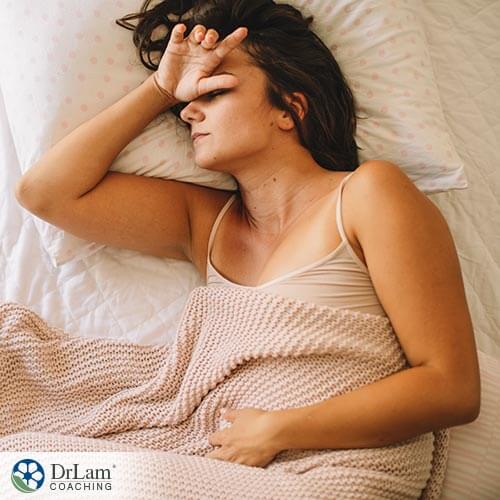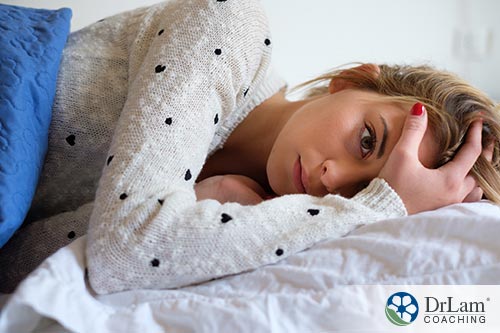 Menstrual migraines are an unfortunately common occurrence for many women. And they can really take a toll on you. Many women find themselves unable to focus at work or even unable to leave their beds for a few days. And considering this happens once a month, these types of migraines can be quite disturbing and debilitating.
Menstrual migraines are an unfortunately common occurrence for many women. And they can really take a toll on you. Many women find themselves unable to focus at work or even unable to leave their beds for a few days. And considering this happens once a month, these types of migraines can be quite disturbing and debilitating.
As you already know, pre-menstrual and menstrual symptoms have to do with the change in your hormone levels during your cycle. But the good news is that if you manage to sync your diet and lifestyle with your cycle, you will find a lot of relief from these symptoms as well as a much greater sense of vitality and wellbeing.
Every woman’s cycle is slightly different, but in order to give you an example that you can work with, we’ll use a 28-day cycle, which is more or less the most common cycle length. Then, you can adjust the information for your cycle length
The first phase of your cycle is called the follicular phase, and it starts on the first day of your period until day 14. It’s basically the phase where your body is preparing one of your eggs for release. Generally, this is when your estrogen levels increase.
Next comes the ovulation phase, which is just one day. Usually, day 14. And this is the day when the egg has matured and been released. From day 15 until day 28, you’re in the luteal phase. This when your body prepares for the possibility of the egg’s fertilization. Your progesterone levels increase during this phase and the walls of your uterus thicken.
If the egg is fertilized, you don’t get a period and start the cycle again. But if it doesn’t get fertilized, then you begin your cycle with day 1 of your period again.
An increase in estrogen levels, then, maybe the trigger of your menstrual migraines. And, unfortunately, most women actually have quite high estrogen levels compared to progesterone levels. This is a condition called estrogen dominance, and it can exacerbate your susceptibility to estrogen-related migraines.
Estrogen dominance is also a symptom of Adrenal Fatigue Syndrome (AFS).
AFS is a condition that you get if your body has been facing chronic stress. Your adrenal glands have to overwork to produce your body’s main anti-stress hormone, cortisol. And we estimate that it, along with estrogen dominance, can affect around 80% of adults at least once in their lives.
Symptoms of AFS include fatigue, weight gain, insomnia, brain fog, anxiety, mild depression, hair loss, dry skin, loss of libido, PMS, infertility, hypoglycemia, salt and sugar cravings, lowered immunity, food and drug sensitivity, and heart palpitations.
Because your adrenal glands are one component of your NeuroEndoMetabolic (NEM) Stress Response’s Hormone Circuit, they can affect the other components of this circuit: the thyroid and gonads. In women, the gonads constitute the ovaries, which are what release female sex hormones.
So, if you have AFS, your ovaries may also be dysregulated. And that’s what can create imbalances in your estrogen and progesterone levels. If this is indeed the case, then getting a personalized adrenal fatigue recovery plan might be a huge step towards migraine relief. And, because it will be personalized, it will take into account your cycle and your hormonal imbalances.
This will require the skill of an expert medical professional with experience in both adrenal fatigue and estrogen dominance. Most likely, this personalized recovery plan will include dietary changes, a gentle supplements protocol, stress management techniques, sleep hygiene practices, and possibly some hormone-balancing herbs.
The following are 5 tips to help you reduce the risk of getting migraines during menstruation:
 One study showed that regular aerobic exercise (at least three times a week) reduced the frequency of migraines as much as taking the medication Topamax. Other findings suggest that high impact interval training (HIIT) and yoga may have similar effects. Light exercise can also help decrease the severity of menstrual migraines if you can do it right at the onset.
One study showed that regular aerobic exercise (at least three times a week) reduced the frequency of migraines as much as taking the medication Topamax. Other findings suggest that high impact interval training (HIIT) and yoga may have similar effects. Light exercise can also help decrease the severity of menstrual migraines if you can do it right at the onset.
But there are two caveats worth mentioning here. The first is that overexercising can be a migraine trigger in its own right. The second is that exercise can worsen your AFS, especially if it’s in the more advanced stages. So it’s important that you assess your exercise routine in the context of your current condition and adjust accordingly.
Americans are notoriously deficient in magnesium. And since this mineral plays a key role in many important functions, a deficiency in it can create a lot of problems. Some of those include how your nerves process pain, an increase in the aggression of platelet cells, and a change in the release of certain neurotransmitters. These can all contribute to triggering migraines.
Although you should aim to increase your magnesium intake mainly through food, you may require a supplement at first to boost your levels. But with any kind of supplement, you shouldn’t make this decision on your own if you have AFS. AFS can make you more vulnerable to paradoxical reactions and more sensitive to certain substances.
There are a few well-known migraine triggers. One of the biggest ones is glutamate. So reducing or avoiding it, whether in its natural or synthetic forms, may help prevent menstrual migraines. Glutamate-rich foods include milk, soy, eggs, and wheat.
Caffeine is another well-known trigger, but it actually has different effects on different people. For some, caffeine-intake can be the migraine trigger, for others it’s caffeine-withdrawal. You should work with your healthcare professional to determine which group you fall into.
But keep in mind that caffeine is generally overused, especially in those with AFS that don’t know it. It’s a stimulant that temporarily gives you the energy you’re missing with adrenal fatigue. But it usually backfires because it can add pressure on your adrenal glands and aggravate your AFS even more. At the same time, you may not want to go cold turkey with caffeine if you have AFS, as that can also be too much pressure. A slow reduction is a better approach.
For best results with this prevention tip, keep a food diary and eliminate any foods you suspect trigger your migraines. Then, you can introduce them back one at a time and see if your body reacts. Avoid any of the suspect foods that do end up triggering your migraines.
This also helps with AFS, hormone balance, and mental/emotional wellbeing. The usual stress management techniques can work wonders here, but only if you do them consistently. Journaling, walking in nature, reducing your chores, taking time off work, connecting with friends and family, going to a support group, going to therapy, and meditating can all help.
There are also certain types of complementary and alternative medicine that can be very useful. For example, acupuncture can help with stress and anxiety relief, but it can also be used to target migraines directly. It works by activating certain brain pathways that help reduce pain.
 Many women we work with will only take time off to rest when they’re down with something. Otherwise, they are working, taking care of their families, keeping up with house chores, and getting some social time in between. This catches up with them eventually, no matter how much they exercise or eat well.
Many women we work with will only take time off to rest when they’re down with something. Otherwise, they are working, taking care of their families, keeping up with house chores, and getting some social time in between. This catches up with them eventually, no matter how much they exercise or eat well.
We urge you to see rest and sleep as not just recovery tools, but wellbeing maintenance essentials. You should try your best to have time off for yourself and to take the necessary sleep hygiene steps to get the best sleep you can every single night.
Of course, when you have menstrual migraines, you will also likely need more rest and sleep than usual. But the same sleep hygiene rules apply. Keep your room cool and dark, eat a light snack before bed to avoid hypoglycemia at night, stop using screens at least two hours before bed, and do something relaxing to wind down at bedtime.
Although menstrual migraines can have many different risk factors and triggers, there are few simple things you can do to help prevent them as much as possible. And if prevention doesn’t work, these same tips will help reduce their severity.
Estrogen dominance is a big factor with these types of migraines, and since it’s a very common condition, it’s a good idea to check if this is your case as well. On top of that, estrogen dominance is frequently a side-effect of adrenal fatigue and NEM Hormone Circuit dysregulation. So, taking care of these conditions may lessen your migraines substantially.
Just please keep in mind that some of these tips may not work for your specific case and needs, so it is really important that you create an individualized plan together with your healthcare provider.
If you have questions about your Hormone Circuit, estrogen dominance, or how AFS can affect menstrual migraines, you can contact the Dr. Lam Coaching team. We can offer you a free** no-obligation phone consultation at +1-626-571-1234 where we will privately discuss your symptoms and what your options are. You can also send us a question through our Ask The Doctor system by clicking here.
Menstrual migraines can be debilitating. And once they onset, they can be very difficult to treat. So the better approach is to try to lessen their frequency or prevent them altogether. These 5 simple tips can really help you do that.
